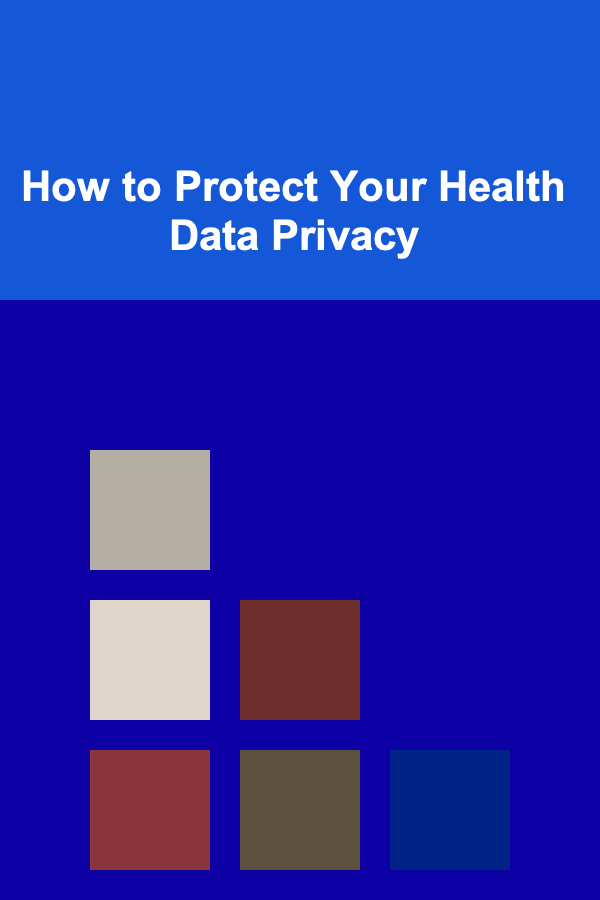
How to Protect Your Health Data Privacy
ebook include PDF & Audio bundle (Micro Guide)
$12.99$7.99
Limited Time Offer! Order within the next:

In today's digital age, the collection and use of personal health data are increasingly prevalent, with many individuals relying on various online platforms, wearable devices, and health apps to manage their health and wellness. From tracking exercise and diet to managing chronic conditions, health data has become an essential part of the modern healthcare ecosystem. However, with this data collection comes significant privacy risks, as health data is highly sensitive and can be exploited if exposed or misused.
This article explores the importance of protecting health data privacy, the risks associated with improper handling of health information, and the steps individuals and organizations can take to safeguard this data. In an era where cyber threats are growing and regulatory frameworks are still catching up, it's crucial to stay vigilant and proactive in managing health data privacy.
Why Health Data Privacy Matters
Health data includes a wide range of sensitive information, including medical records, genetic data, treatment history, and behavioral health information. This data provides a detailed picture of an individual's physical and mental health, making it a target for cybercriminals and malicious actors. Unlike other types of personal data, such as credit card numbers or addresses, health data can be used to identify individuals, make decisions about their care, and potentially even exploit their vulnerabilities.
The consequences of health data breaches are severe and can be life-changing for individuals. Leaked medical information can lead to identity theft, discrimination in the workplace or insurance market, and even physical harm in cases of stalking or targeting by criminals. For organizations, mishandling health data can result in hefty fines, loss of customer trust, and reputational damage.
Moreover, the increasing use of health data for research and commercial purposes raises ethical concerns. Data analytics and machine learning techniques can be applied to health data to uncover insights and patterns, but this also raises questions about consent, ownership, and control over personal health information. As individuals become more aware of the risks involved, the demand for stronger protections and clearer policies around health data privacy is growing.
The Risks to Health Data Privacy
While health data privacy is an urgent concern for individuals, the risks to this privacy can come from various sources, including:
1. Data Breaches and Cyberattacks
Health organizations, hospitals, and insurance companies store vast amounts of health data, making them prime targets for cybercriminals. Data breaches can occur through hacking, phishing attacks, or malware infiltration. These breaches often expose personal health information such as diagnoses, treatments, and payment details. When health data is compromised, it can be sold on the dark web, leading to identity theft, fraudulent medical claims, or even blackmail.
2. Lack of Secure Data Sharing Practices
Health data is often shared between multiple entities, including hospitals, clinics, research institutions, and insurance companies. While data sharing is essential for improving patient care and advancing medical research, the lack of secure protocols and encryption measures can put sensitive health data at risk. If data is not properly protected during transit or at rest, it can be accessed by unauthorized individuals, leading to privacy violations.
3. Third-Party Apps and Wearables
The proliferation of health-tracking apps and wearable devices has created new avenues for collecting and sharing health data. While these tools can provide individuals with valuable insights into their health, they often lack strong data privacy protections. Many of these apps and devices collect detailed health information, such as heart rate, sleep patterns, and exercise routines. If this data is shared with third-party companies or used for commercial purposes without the user's informed consent, it can compromise the individual's privacy.
4. Employee and Insider Threats
Healthcare organizations face the threat of insider breaches, where employees or contractors misuse their access to sensitive data. Employees with access to patient information may misuse it for personal gain, either by selling it to third parties or using it for identity theft. Implementing strong access controls and monitoring systems is essential for minimizing the risks posed by insiders.
5. Inadequate Privacy Policies and Regulations
Despite the increasing awareness of data privacy, many organizations still lack comprehensive privacy policies, leaving individuals vulnerable to privacy violations. Even when privacy regulations exist, such as the Health Insurance Portability and Accountability Act (HIPAA) in the United States, enforcement may be lax, and some organizations may fail to comply with data protection standards. Without clear regulations and strict enforcement, health data remains at risk.
Steps to Protect Your Health Data Privacy
Given the risks to health data privacy, individuals and organizations must take proactive steps to protect personal health information. Below are key strategies to safeguard health data privacy:
1. Be Informed About Your Rights and Consent
Individuals should be aware of their rights regarding health data privacy. In many jurisdictions, laws such as HIPAA in the U.S. or the General Data Protection Regulation (GDPR) in Europe grant individuals control over their health data. Under these regulations, healthcare providers, insurers, and other entities must obtain informed consent from individuals before collecting, processing, or sharing their health information.
Before using a health app or device, review its privacy policy carefully. Ensure that the app or device only collects the data that is necessary for its intended purpose and that the data is protected with strong encryption methods. You should also have the option to revoke consent and delete your data at any time.
2. Use Strong and Unique Passwords
One of the easiest ways to protect your health data privacy is by using strong and unique passwords for any health-related accounts. This includes online portals for healthcare providers, insurance companies, or health-tracking apps. Passwords should be complex and not reused across multiple sites. Consider using a password manager to store your credentials securely.
For added protection, enable multi-factor authentication (MFA) where possible. MFA requires users to verify their identity through multiple methods, such as a fingerprint scan or a one-time code sent via text message, in addition to entering a password.
3. Encrypt Your Health Data
Encryption is one of the most effective ways to protect health data. When health data is encrypted, it is transformed into unreadable code that can only be accessed by individuals with the decryption key. If your health data is stored on a device, such as a smartphone, tablet, or laptop, ensure that encryption is enabled.
Additionally, when sharing health data online, ensure that the platform uses secure communication protocols such as HTTPS, which encrypts data in transit. Avoid using public Wi-Fi networks for sharing or accessing health data, as these networks are more susceptible to eavesdropping and cyberattacks.
4. Limit the Data You Share
When using health-tracking apps, wearables, or online health services, be mindful of the data you share. Limit the information to what is absolutely necessary for the service to function. For example, if a fitness app does not require access to your location or contacts, do not grant it these permissions.
Furthermore, if the app or service asks for access to sensitive information, such as your medical history or genetic data, consider whether it is worth sharing. Some services may offer valuable insights, but sharing too much data could compromise your privacy in the long term.
5. Regularly Review and Update Your Privacy Settings
Many health apps and services have privacy settings that allow you to control what data is collected, how it is used, and who it is shared with. Periodically review these settings to ensure that they align with your privacy preferences. If an app has recently updated its privacy policy or terms of service, read them carefully to ensure that it still complies with your expectations.
If you no longer use a health service or app, delete your account and request that your data be removed from the platform. Some apps retain your data even after you've stopped using the service, which could pose a privacy risk in the future.
6. Use Trusted and Reputable Platforms
When selecting health apps, devices, or services, choose those that have a strong reputation for protecting privacy. Look for certifications, such as the TRUSTe seal or compliance with HIPAA or GDPR, to ensure that the platform follows best practices in data protection. Trusted companies are more likely to have robust security measures in place and be transparent about how they handle user data.
7. Monitor Your Health Data
Keeping an eye on how your health data is being used is crucial for detecting potential privacy breaches. Many organizations provide audit trails or logs of who has accessed your health data. If you notice any unauthorized access or discrepancies, report it immediately to the organization or service provider.
8. Advocate for Stronger Privacy Protections
As individuals, we also have a role to play in advocating for stronger health data privacy protections. Support policies and regulations that promote transparency, accountability, and control over personal health data. Engage in public discussions about the ethical implications of data collection and use, and encourage organizations to prioritize privacy in their operations.
9. Work with Healthcare Providers Who Prioritize Privacy
Choose healthcare providers who demonstrate a commitment to protecting patient privacy. Look for providers who are transparent about their data handling practices and who take steps to ensure that their systems and processes are secure. Ask questions about how your health data will be used, shared, and stored, and ensure that your provider complies with relevant privacy laws.
Conclusion
Health data privacy is an essential consideration in today's interconnected and data-driven world. As individuals become more reliant on digital tools to manage their health, the risks to their privacy grow. From data breaches and cyberattacks to third-party data sharing and insufficient privacy policies, the threats to health data are diverse and complex. However, by taking proactive steps such as using strong passwords, encrypting data, and being mindful of the data shared with apps and services, individuals can protect their health information and maintain control over their privacy.
It is essential that healthcare organizations, policymakers, and technology providers continue to work together to strengthen the protections surrounding health data. With a collective effort, we can ensure that individuals can confidently manage their health without fearing for their privacy.

How to Create an Indoor Exercise Routine for Your Pet
Read More
How to Make a Checklist for Time Management and Productivity
Read More
How to Organize Jewelry by Style and Occasion
Read More
How to Plan a Successful Outdoor Party in Your Backyard
Read More
Why Using a Timer Can Make Decluttering Less Overwhelming
Read More
10 Tips for Bankroll Management in Tournaments
Read MoreOther Products

How to Create an Indoor Exercise Routine for Your Pet
Read More
How to Make a Checklist for Time Management and Productivity
Read More
How to Organize Jewelry by Style and Occasion
Read More
How to Plan a Successful Outdoor Party in Your Backyard
Read More
Why Using a Timer Can Make Decluttering Less Overwhelming
Read More